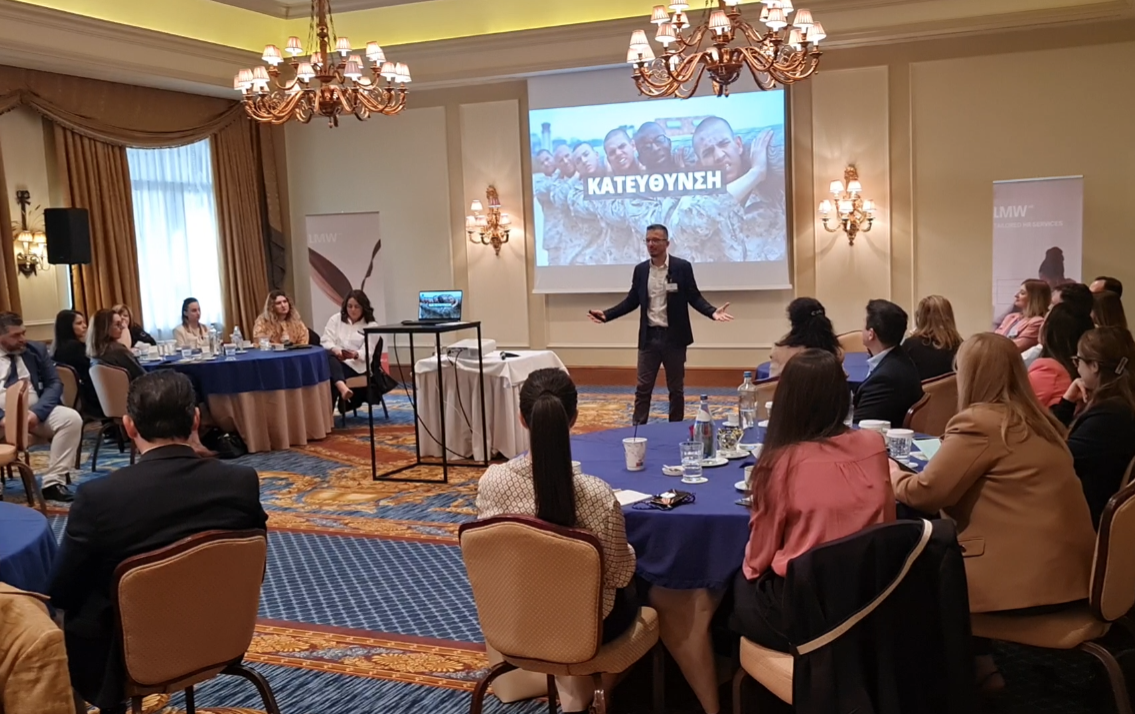Culture is the Alchemy of Success – event highlights
The phrase “culture eats strategy for breakfast” is today more relevant than ever and HR professionals are increasingly realising its effects.
As a people-to-people company, LMW designed and launched a series of executive round tables, to bring HR executives into an engaging and open conversation about real-life issues; to get inspired from one another and share their worries, thoughts, and ideas.
The discussion around culture kicked-off with the first round table of the series which took place on April 5th at the Hotel Grande Bretagne.
Titled “Culture is the Alchemy of Success”, the event brought together HR executives and people that manage people, who enthusiastically embraced the initiative, calling it “a very inspiring initiative with a lot of food for thought about HR’s everyday life and the challenges we all face.”
We had with us the expert in communication and human resources, Dr. Savvas Trichas, who provided the triggers and ideas that ignited the discussion during the event, but also at the lunch that followed.
In this article, we share the highlights of both the speeches and the discussion that followed.
Why the emphasis on culture today?
Answering this question, Christine Vantola, Founder and CEO of LMW and advocate of Peter Drucker’s phrase “culture eats strategy for breakfast“, noted that 20 years ago what we called corporate culture was imprinted in the world’s consciousness from the pages of finance newspapers, a press release or maybe a TV commercial. But now, candidates look to social media to understand the mood of a business.
As a result, Marketing and HR are constantly trying through these platforms to project and “convince” about the company culture. And this is where we observe a great contradiction in relation to what is discussed in the internal meetings.
The strategy of this projection does not belong to the agenda of the ‘business’ strategy and does not have a primary role. And this is because traditionally meetings that do not have numbers and PNL, are considered less or not at all serious.
However, we believe, emphasized Christine, that while the strategy determines the path, the cultivation of the corporate culture fuels the journey. Company culture is the secret ingredient that makes the difference and almost always determines the outcome.
How do we define culture and why is it important?
At this point, the guest of honour and speaker of the event, Dr. Savvas Trichas, who gave a very human and true definition: “Culture is how the hearts and stomachs of workers feel on Sunday evening for Monday morning!“. He supported this definition with data from a study conducted by Harvard University on 200 companies over 11 years. The study found that companies with a strong, yet flexible organizational culture saw revenue growth of up to 682%.
Savvas then proceeded to present in a very contagious way the dominant elements that make organizational culture extremely important for any business and organization:
The roots of the organization
Taking the example of Hyperion, the tallest tree in the world that derives its strength from its roots that are invisible below the surface, Savvas resembled organizational culture as the roots of a business. Although we cannot see it, yet we feel it. We feel it in successful businesses the same way we do when it is absent or toxic.
Flexibility and adaptability
According to McKinsey research the average life of a business in 1958 was 61 years. Today is less than 18 years, and in the next 3 years 75% of the companies in the S&P 500 will be gone. “We’re going through the most intense period of change we’ve ever experienced,” Savvas said, citing the examples of Encyclopaedia Britannica and Kodak, explaining that businesses can no longer be complacent that practices that worked in the past will continue to work in the future. Instead, they must be able to see the coming changes and adapt accordingly.
Direction and motivation
Regarding the direction, Savvas referred to the special forces of Cyprus and an experiment they did during the initial training. One of the exercises was to shoulder a trunk as a group. Traditionally, transporting the trunk is done within the camp and is considered a chore. In the experiment, they asked the trainees to carry the log out of the camp to the top of a hill and when they got there raise the flag. What they found was that not only did the soldiers cover the distance in much less time than a corresponding distance in the camp, but also but they encouraged each other along the way. The reason? They were motivated and had direction.
Here the guests agreed that one of the biggest disincentives for employees is that they have no visibility of the company’s direction, which in turn makes them less loyal or, as Christine added, makes employees forget that we are all “playing on the same team“.
At this point the question was about how can we give direction and inspire employees, and how can we match some of our employees’ motivators with the company’s incentives?
Tolerance and disregard
Research shows that toxic employees can significantly decrease team performance (up to 40%!) and everyone at the event agreed that good employees become discouraged when leadership tolerates negative behaviour and overlooks loyalty.
In the same research it was also observed that some participants had the ability to moderate the influence of a toxic employee with their positive behaviour, which led the discussion to the next element of culture.
Character, Skills and Alignment
Simulating an experiment done by American author Zig Ziglar, Savvas asked guests to name characteristics of the ideal employee. Words like ‘loyal’, ‘enthusiastic’, ‘kind’, ‘hardworking’ were heard. Each one a character trait, not skill!
And here the question was raised “how do we evaluate and hire a candidate who may not have all the skills for the role, but has other characteristics and social elements that can positively affect the performance of the team and the business?”
At this point it was emphasized that the most successful companies hire based on character and ensure that the hiring process considers whether the candidate’s character aligns with the company’s culture.
Confidence & empowerment
“The best way to see if you can trust someone is to trust them!” And with this very simple but important prompt, the discussion turned to empowerment. Savvas challenged the traditional view of empowerment as something a company “gives” to employees. He argued that talented employees already possess power, and empowerment is about removing obstacles, getting out of their way and allowing them to thrive.
Performance reviews
With these 6 concepts we closed the first part of the event, sparking the discussion that followed in the second part. The topics discussed were many and highlighted how necessary these meetings are where the guests can be “more real and say here I have a problem, how do you deal with it?” as Evi Koutsougera, HR Manager of Voltalia, commented.
One of the topics the second part centred on were performance reviews:
- Encouraging employees to view performance reviews as development opportunities and to be honest in their feedback.
- Developing methods to measure the impact of company culture on business performance.
- Moving away from outdated annual reviews, especially for younger employees who seek more frequent feedback and growth opportunities.
Here Christine pointed out that performance reviews is the only time the employee has power, and HR’s role is to manage it with care.
Christine closed the event by making an appointment for the next round table in Autumn and emphasizing “Our goal is to help HR executives get inspired about important people matters, through meaningful dialogue and an open mind. We hope we succeeded!”
For more information about the event and on how to make culture a driver for growth, get in touch at info@lmwgroup.com.




